

What are Cognitive Skills and Abilities? By: Dr.
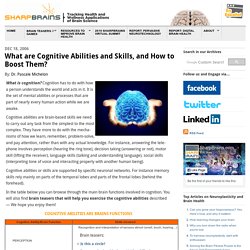
Pascale Michelon What is cognition? Cognition has to do with how a person understands the world and acts in it. It is the set of mental abilities or processes that are part of nearly every human action while we are awake. Cognitive abilities are brain-based skills we need to carry out any task from the simplest to the most complex. Cognitive abilities or skills are supported by specific neuronal networks. In the table below you can browse through the main brain functions involved in cognition.
With age, some cognitive abilities tend to decline, especially the so-called executive functions, 8 Core Cognitive Capacities. Cognitive Skills - The 8 Core Cognitive Capacities. What is Normal Cognitive Aging? iStock.com/PeopleImages.
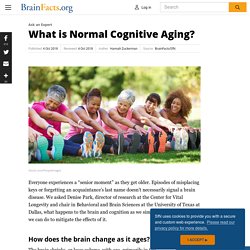
6 Ways that Thinking Changes with Aging (& What to Do About This) Cognitive Skills and the Aging Brain: What to Expect. Every day we perform hundreds of cognitive tasks but are mostly unaware of the effort involved.
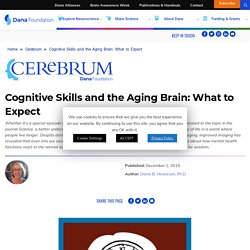
These tasks take different forms, such as noticing colors, remembering names, or calculating time on a watch. Measures of brain function using functional magnetic resonance imaging (fMRI) show that the most active areas of the brain vary according to the task being performed. How memory and thinking ability change with age. Scientists used to think that brain connections developed at a rapid pace in the first few years of life, until you reached your mental peak in your early 20s.
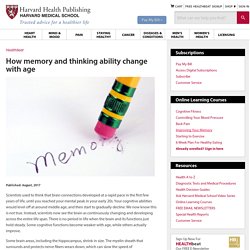
Your cognitive abilities would level off at around middle age, and then start to gradually decline. We now know this is not true. Instead, scientists now see the brain as continuously changing and developing across the entire life span. There is no period in life when the brain and its functions just hold steady. Some cognitive functions become weaker with age, while others actually improve. Some brain areas, including the hippocampus, shrink in size. On the other hand, the branching of dendrites increases, and connections between distant brain areas strengthen. Aging & Cognitive Function. How does aging affect memory and cognition (thinking)?
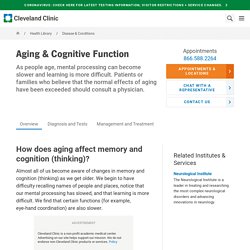
Almost all of us become aware of changes in memory and cognition (thinking) as we get older. We begin to have difficulty recalling names of people and places, notice that our mental processing has slowed, and that learning is more difficult. We find that certain functions (for example, eye-hand coordination) are also slower. Cleveland Clinic is a non-profit academic medical center. Advertising on our site helps support our mission. Memory, Forgetfulness, and Aging: What's Normal and What's Not? Many older people worry about their memory and other thinking abilities.
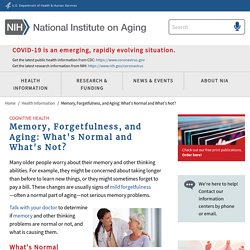
For example, they might be concerned about taking longer than before to learn new things, or they might sometimes forget to pay a bill. How the Aging Brain Affects Thinking. The brain controls many aspects of thinking — remembering, planning and organizing, making decisions, and much more.
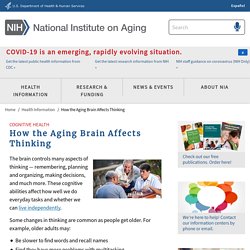
These cognitive abilities affect how well we do everyday tasks and whether we can live independently. Some changes in thinking are common as people get older. For example, older adults may: Be slower to find words and recall names Find they have more problems with multitasking Experience mild decreases in the ability to pay attention Aging may also bring positive cognitive changes. Despite the changes in cognition that may come with age, older adults can still do many of the things they have enjoyed their whole lives. Exercise Helps Older People Stay Sharp and Remember More.
Exercise has so many health benefits: it can help prevent osteoporosis, lower cholesterol, reduce the pain of fibromyalgia, ease the symptoms of menopause, and reduce your risk of developing breast cancer, colon cancer, and prostate cancer.
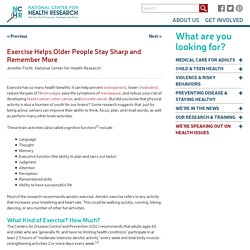
But did you know that physical activity is also a fountain of youth for our brains? Some research suggests that, just by being active, seniors can improve their ability to think, focus, plan, and recall words, as well as perform many other brain activities. These brain activities (also called cognitive function)[1] include: LanguageThoughtMemoryExecutive function (the ability to plan and carry out tasks)JudgmentAttentionPerceptionRemembered skillsAbility to have a purposeful life Most of the research recommends aerobic exercise.
Why Exercise Protects Your Brain’s Health (and What Kind Is Best) You’ve taken to heart recommendations to get at least 150 minutes of moderate-intensity aerobic physical activity a week to improve your physical fitness.
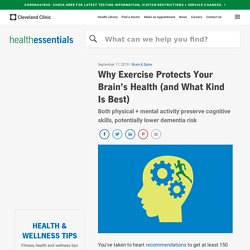
Cleveland Clinic is a non-profit academic medical center. Advertising on our site helps support our mission. We do not endorse non-Cleveland Clinic products or services. Policy What you might not realize is that with every step you take, every mile you pedal or every lap you swim around the pool, you’re enhancing your cognitive fitness. “We know that physical exercise, and aerobic exercise in particular, is very beneficial for maintaining brain health, even in people who are at risk for developing dementia and Alzheimer’s disease (AD),” says neuropsychologist Aaron Bonner-Jackson, PhD. Regular exercise changes the brain to improve memory, thinking skills.
There are plenty of good reasons to be physically active.
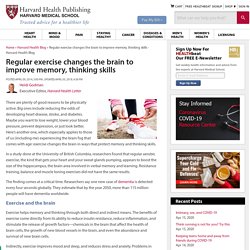
Big ones include reducing the odds of developing heart disease, stroke, and diabetes. Maybe you want to lose weight, lower your blood pressure, prevent depression, or just look better. 5 Benefits of Exercise for Seniors and Aging Adults. How Exercise Helps Protect Your Brain From Cognitive Decline. Physical Activity for Older Adults. Significant health benefits are seen in adults aged 65 years and older who participate in regular physical activity.
The 2008 Physical Activity Guidelines recommend older adults to incorporate aerobic activity, muscle-strengthening activity, and balance training for older adults at risk for falls. Try to avoid inactivity because some health benefits can occur with any amount of physical activity gain. Tai Chi can improve cognitive function in older adults with cognitive impairment and healthy older adults. Aerobic Exercise May Protect Aging Brains from Dementia Symptoms. A new study finds that aerobic exercise may help combat changes in the brain associated with dementia.But any kind of exercise is associated with a decreased risk of developing Alzheimer’s disease or dementia. Other research is being done to see if cholesterol levels are associated with risk of developing dementia.
Physical activity can help prevent Alzheimer’s disease, but new research finds aerobic exercise in particular may help slow shrinkage in the hippocampus, the part of the brain that deals with memory. Eight Habits That Improve Cognitive Function. The New York Times recently published an article about the "brain fitness" business, "Do Brain Workouts Work? Science Isn’t Sure. " I believe the answer is no. 5 Ways to Improve Memory and Cognitive Function with Exercise. Everyone worries about their memory and the state of their cognitive health from time to time, but what can you do to be proactive about it? According to the Alzheimer's Association's 2016 Facts & Figures, 1 in 9 people age 65 and older has Alzheimer's disease and an estimated 5.4 million Americans of all ages have Alzheimer's in 2016.
More women than men have Alzheimer's and other forms of dementia, as almost two-thirds of Americans with these disorders are women. One of the earliest warning signs of Alzheimer's is the experience of worsening memory loss or more frequent confusion. However, occasionally forgetting your keys or the name of someone you recently met does not apply. Cognitive decline refers to more serious issues such as forgetting things you would normally know or how to do things you've always done.
If you’ve cared for people with Alzheimer’s before, you know it can be hard to get through to them sometimes. 1. 3. 4. Meditation is also good for caregivers. 1. For cognitive health, exercise should engage your brain as well as your body. The single best thing you can do to fight off the cognitive decline that typically accompanies aging is to exercise regularly. Aerobic exercise helps. So does strength training. What kinds of exercise are good for brain health?
My interest in reaping the brain health benefits of exercise comes not only from my work as a physical therapist and researcher in this field, but is also driven from a very personal place that unfortunately many of us have witnessed or will witness in our lifetime: a family member with disabling memory loss. In my case, it was seeing the crippling effects Alzheimer’s disease had on my grandfather, who passed away from complications related to his condition not so long ago. Brain-training game launched to boost seniors' cognitive health, Singapore News. SINGAPORE - A set of mobile-phone games has been created to help boost the cognitive health of seniors. The Android games are memory-based and target people above the age of 50. They incorporate basic matching, counting and sequencing skills, with a time limit of two minutes. Called MindWorks, the set of six brain training games was launched on Tuesday (Aug 22) at Temasek Polytechnic's (TP) Ageing Symposium 2017, held on the school's campus in Tampines.